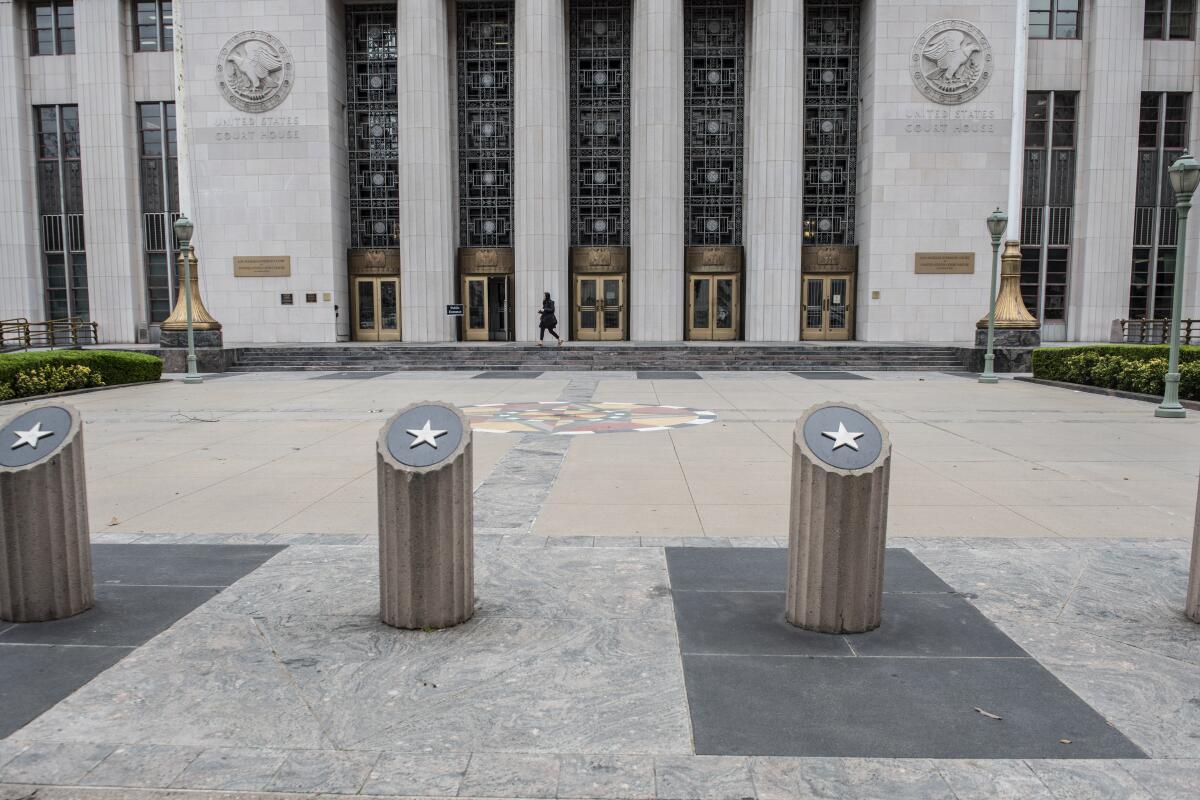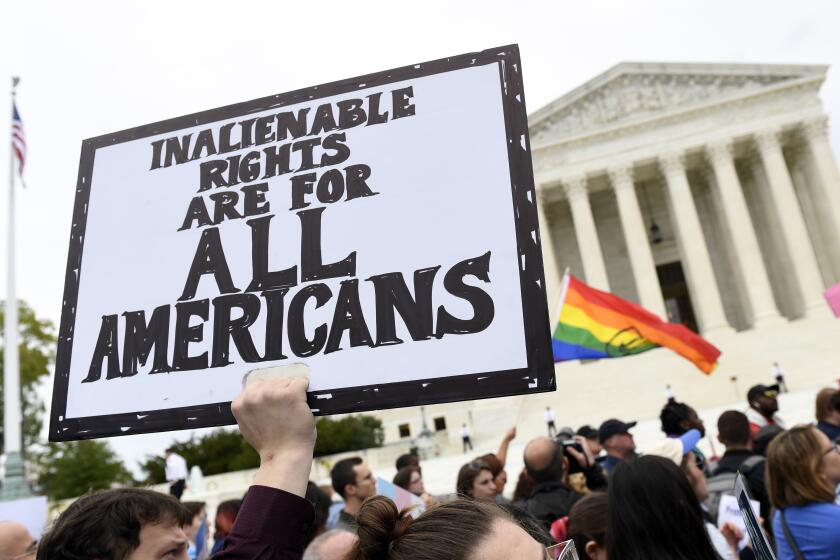Op-Ed: The federal bench has a staggering lack of LGBTQ judges

- Share via
Today in California, where about 100 judges preside in federal trial and appellate courts, just two are openly LGBTQ. LGBTQ Californians make up over 5% of the state’s adult population and over 11% of the state’s youth. Yet there is only one openly LGBTQ judge among the state’s 74 federal district court judges and only one among the 9th Circuit’s 29 active appellate judges. It’s time for our two senators and President Biden to address this lack of diversity on the bench.
Every day, federal judges make decisions that affect our lives in important ways. They determine the breadth of our fundamental rights, ensure fairness in criminal proceedings and occasionally make decisions that change the course of history.
Martin Jenkins, Gov. Gavin Newsom’s pick for the state’s highest court, becomes the first openly gay justice and the fifth Black member to serve on the court.
While the federal courts strive to be above the fray, their decisions are often viewed through the lens of partisan politics. But even when judicial decisions may be unpopular, they have more credibility when they are made by a judiciary that reflects the nation’s full diversity.
Though someone must lose in nearly every court case, what is critical is that everyone feels that they had their “day in court” — that their arguments were heard and fairly considered. But it’s hard for people to have that faith when the bench lacks the perspective of a marginalized community that has frequently been denied equal rights under the law.
Many LGBTQ people who interact with the judicial system do not feel they have equal access to justice. Studies in a number of states, including California, have consistently shown that LGBTQ litigants, witnesses and jurors report negative interactions with the court system, including prejudicial comments and actions toward LGBTQ people. How they are treated and the negative things they hear in courtrooms, as well as who they see — or don’t — on the bench change courtroom culture and the perception of justice.
Beyond the issue of public trust in the legal system, diversity also improves decision-making. Research from the business world documents that having diverse teams in general can lead to more factual, careful and creative decisions. LGBTQ-supportive policies and workplace environments lead to better job commitment and satisfaction, workplace relationships, health outcomes and productivity among LGBTQ employees, all victories for organizations.
And research has specifically shown that diversity in the judicial decision-making process affects the development of the law. One study of outcomes in civil rights cases found that plaintiffs were twice as likely to prevail if a female judge was on the appellate panel hearing the case, indicating that even if the panel was majority male, male judges were likely to view a case differently if one female judge participated in the deliberations.
In more than half the country today, a person can be kicked out of a store solely for being LGBTQ and there is no federal recourse.
Indeed, despite the common portrayal of lone judges proclaiming from the bench, the law is actually shaped over time by many judges in conversation with one another. Whether considering precedent written by other judges, reviewing the decisions of lower courts in the appellate courts or collaborating on panels, judges do not work in isolation.
Just as Justice Ruth Bader Ginsburg referenced her experience as a 13-year-old girl to evaluate the harm caused by a strip search of a female student while at school, and Justice Sonia Sotomayor’s approach to police stops has been informed by hearing her brother get “the talk” that Black and brown parents routinely give their sons, LGBTQ judges will also bring their life experiences to the collaborative process that decides cases and develops the law.
Sens. Dianne Feinstein and Alex Padilla have supported diversifying the federal bench in California this year, and the president has nominated an exceptional group of racially and ethnically diverse candidates from California to “ensure that the nation’s courts reflect the diversity that is one of our greatest assets as a country,” as a White House statement recently noted. And yet that statement did not name or celebrate any out members of the LGBTQ community.
During the previous administration, the Senate confirmed 226 of President Trump’s nominees to the federal bench, reshaping the courts for years to come. The Biden administration has been working to make the federal courts look more like America. Feinstein and Padilla should use future recommendations to address the stark underrepresentation of LGBTQ Californians on the federal courts.
Brad Sears is the founding executive director and David Sanders distinguished scholar of law and policy at the Williams Institute at the UCLA School of Law.
More to Read
A cure for the common opinion
Get thought-provoking perspectives with our weekly newsletter.
You may occasionally receive promotional content from the Los Angeles Times.











